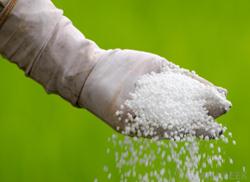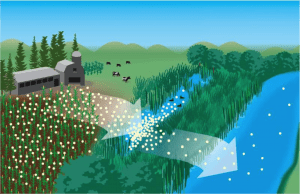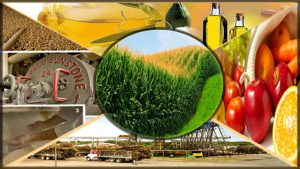Negative Effect of Synthetic Fertilizers
“Fertilizer is good for the father and bad for the sons.”
–Dutch saying
What Is Fertilizer?
Fertilizer is any substance used to add nutrients to the soil to promote soil fertility and increase plant growth.
Unfortunately, as unsustainable farming and gardening practices continue our soil is stripped of its health and we depend on amendments even greater. This leads to some pretty negative effects of chemical fertilizers.
Negative Effects of Chemical Fertilizers
Groundwater contamination:
The biggest issue facing the use of chemical fertilizers is groundwater contamination. Nitrogen fertilizers break down into nitrates and travel easily through the soil. Because it is water-soluble and can remain in groundwater for decades, the addition of more nitrogen over the years has an accumulative effect.
One popular fertilizer, urea, produces ammonia emanation, contributes to acid rain, groundwater contamination and ozone depletion due to release of nitrous oxide by denitrification process. With it’s increased use and projections of future use, this problem may increase several fold in the coming decades. Groundwater contamination has been linked to gastric cancer, goitre, birth malformations, and hypertension; testicular cancer and stomach cancer.
Excessive air- and water-borne nitrogen from fertilizers may cause respiratory ailments, cardiac disease, and several cancers, as well as can “inhibit crop growth, increase allergenic pollen production, and potentially affect the dynamics of several vector-borne diseases, including West Nile virus, malaria, and cholera.”
Perhaps one of the scariest effects of chemical fertilizers is something called methemoglobinemia. In infants it is alternatively known as Blue Baby Syndrome. The risk most often occurs when infants are given formula reconstituted with nitrate contaminated water. The condition causes a decrease in oxygen in the blood and results in a blue-grey skin color, causes lethargy and/or irritability and can lead to coma or death. I’ve been unable to find whether the same risk exists for breastfeeding babies whose mothers drank contaminated water.
Nitrogen groundwater contamination also contributes to marine “dead zones”. The increase in the water-soluble nitrates creates an influx of plant-life, which eats up oxygen and starves out fish and crustaceans. This has an impact not only on the aquatic ecosystem, but on local societies who depend on food sourced from those areas.
Reduce Soil’s Organic matter:
Effect of synthetic nitrogen use is to reduce soil’s organic matter content. Why? Because, they posit, nitrogen fertilizer stimulates soil microbes, which feast on organic matter. Over time, the impact of this enhanced microbial appetite outweighs the benefits of more crop residues.
And their analysis gets more alarming. Synthetic nitrogen use, they argue, creates a kind of treadmill effect. As organic matter dissipates, soil’s ability to store organic nitrogen declines. A large amount of nitrogen then leaches away, fouling ground water in the form of nitrates, and entering the atmosphere as nitrous oxide (N2O), a greenhouse gas with some 300 times the heat-trapping power of carbon dioxide. In turn, with its ability to store organic nitrogen compromised, only one thing can help heavily fertilized farmland keep cranking out monster yields: more additions of synthetic N.
The loss of organic matter has other ill effects, the researchers say. Injured soil becomes prone to compaction, which makes it vulnerable to runoff and erosion and limits the growth of stabilizing plant roots.
Destruction of Soil biodiversity:
Fertilizer application begins the destruction of soil biodiversity by diminishing the role of nitrogen-fixing bacteria and amplifying the role of everything that feeds on nitrogen. These feeders then speed up the decomposition of organic matter and humus. As organic matter decreases, the physical structure of soil changes. With less pore space and less of their sponge-like qualities, soils are less efficient at storing water and air. More irrigation is needed. Water leeches through soils, draining away nutrients that no longer have an effective substrate on which to cling. With less available oxygen the growth of soil microbiology slows, and the intricate ecosystem of biological exchanges breaks down.
Negative impact on Soil Structure:
Long-term use of synthetic fertilizers may have a negative impact on soil structure, according to a study published recently in the Journal of Environmental Quality. Researchers at Kansas State University, who have been observing the effects of inorganic fertilizer use on soil properties during a 50-year study, found that while the application of inorganic sources of nitrogen and phosphorus may increase soil organic carbon, these gains may be offset by hidden costs such as decreased soil macro aggregates. Soil aggregate stability is a key indicator of soil structural quality, because it affects how resistant soil is to erosion and how well water is able to move through the soil. The decreased soil aggregates could be due to ammonium ions in the synthetic fertilizer, which cause soil particles to separate rather than aggregate. This could offset any positive effects of increased soil organic carbon content, while increasing fertilizer runoff that causes pollution of waterways.
Syed Shabbar Hussain Shah
Institute of Soil and Environmental Sciences









Yes, Inorganic fertilizer have negative effects but it can be minimize by follow appropriate using methods. Apply after the get the information about the soil and its type.